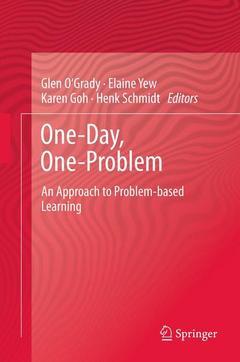One-Day, One-Problem, 2012 An Approach to Problem-based Learning
Coordonnateurs : O'Grady Glen, Yew Elaine, Goh Karen P.L., Schmidt Henk

One-day, one-problem is a unique adaptation of problem-based learning (PBL) pioneered at Republic Polytechnic, Singapore. Here students are challenged each day with a problem from their domain and attain the necessary learning outcomes in the process of responding to the problem. Throughout the day students would engage in small group discussions, self-directed learning and conversations with their teacher who plays the role of a facilitator. This approach to learning and instruction represents a new brand of constructivist learning in a more structured learning environment compared to conventional PBL. This book contains a series of chapters by authors with first-hand experience in the One-day,one-problem PBL approach. Unlike other books on PBL, the chapters are both research-informed and practical. Results of empirical studies into the factors of PBL such as quality of problems, tutor behaviours, scaffoldings, student learning and interest are discussed together with practical implications for the educator.
The book begins with an overview of the one-day, one-problem process, providing a viewpoint from both the student and tutor. Republic Polytechnic?s pedagogical philosophy and epistemological belief of education are introduced with the intent to share how the polytechnic designed and implemented a system that supports the philosophical beliefs. Results and practical implications of empirical studies on the various factors that influence students? learning in PBL are discussed. These include the quality of problems and the use of scaffoldings for students? learning, tutors as facilitators, preparation of staff for PBL, student assessment, how students learn in the process of PBL and student interest.
Introduction and overview.- Preface.- Chapter 1: One-day, one-problem at Republic Polytechnic.- Chapter 2: A brief history of problem-based learning.- Chapter 3: Pedagogical philosophy underpinning one-day, one-problem.- Student learning.- Chapter 4: The process of student learning in one-day, one-problem.- Chapter 5: Problem-based learning and student motivation: the role of interest in learning and achievement.- Chapter 6: The student perspective: How students manage their learning at Republic Polytechnic.- Problems and scaffolds.- Chapter 7: Characteristics of effective problems.- Chapter 8: Scaffolding in problem-based learning.- Assessment.- Chapter 9: Holistic assessment and problem-based learning.- Chapter 10: Assessing student learning: Daily self-assessment at Republic Polytechnic.- Facilitators.- Chapter 11: Teachers as facilitators.- Chapter 12: A staff education and development programme to support PBL.- Conclusion.- Chapter 13: Summary and conclusions.
Glen O’Grady (glen_ogrady@rp.edu.sg) is the Director for the Centre for Educational Development at the Republic Polytechnic, Singapore. He also leads a Problem-based Learning Institute that facilities the development of Problem-based Learning throughout Asia. He has worked at Monash University, The University of Queensland, The National University of Singapore and Ngee Ann Polytechnic and has more than 20 years’ experience in academic staff development in higher and further education. He has run academic development programmes in numerous countries and has published in the areas of Problem-based Learning, Student Assessment and Vocational and Technical Education. He is chair of the International Symposium on Problem-based Learning and is a member of the organising committee for the Pan-American PBL Association. He has been the editor of the International Newsletter PBL Reflections since 2003. <BR><BR>
Elaine H. J. Yew (elaine_yew@rp.edu.sg) is the Assistant Director (Academic) of the Centre for Educational Development at Republic Polytechnic. She has more than 12 years’ experience as an educator both as a secondary school teacher and polytechnic facilitator. She has been actively involved in the design and facilitation of PBL in disciplines including Chemistry, Molecular and Cell Biology, Biochemistry, Science, Cognitive Processes and Problem-Solving. She obtained her doctoral degree in Educational Psychology from the University of Erasmus in Rotterdam, the Netherlands and the theme of her doctoral thesis was “How Students Learn in Problem-based Learning (PBL)”. This was a process-oriented study that examined in detail how and what students learn in the RP-PBL process. She has published in the areas of the process of PBL, tutor behaviours in PBL and scaffolding in PBL. Her current research interests include effective facilitation in PBL and PBL in science education. <BR><BR>
The book serves as a valuable resource as a case-study of how PBL is reinvented across disciplines
Documents a unique approach to Problem-based Learning pioneered at Republic Polytechnic
Combines results of empirical studies with practical implications for the educator
Date de parution : 05-2014
Ouvrage de 300 p.
15.5x23.5 cm
Disponible chez l'éditeur (délai d'approvisionnement : 15 jours).
Prix indicatif 105,49 €
Ajouter au panierDate de parution : 04-2012
Ouvrage de 300 p.
15.5x23.5 cm
Disponible chez l'éditeur (délai d'approvisionnement : 15 jours).
Prix indicatif 105,49 €
Ajouter au panier


